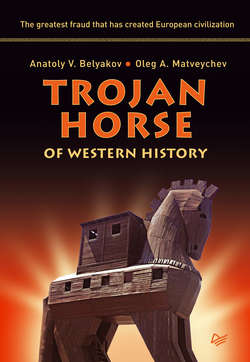Читать книгу Trojan Horse of Western History - Олег Матвейчев - Страница 2
Alternative Introduction
ОглавлениеWe’ve decided not to write a traditional foreword, but to offer ten different answers to the question of what kind of book we have produced, instead.
Here they are:
1. This book is about the fact that the Trojans defeated the Greeks and not the other way around, as it is commonly believed.
2. This book is about the fact that the well-known Greek religion with its specific anthropomorphism was artificially created for some political reasons.
3. This book is about the fact that soft power, information warfare and falsification of history do not constitute innovations, but are the oldest essential features of the Western mind.
4. This book refutes the conventional wisdom that “history is written by the victors”. On the contrary, we have proven that the victors are the ones, who have managed to write history.
5. This book is about our postmodern world, where universals contradict one another, each of them entailing other universals as “my other”, and we have shown the horizons in terms of solving the problem of postmodernism.
6. This book tells the story of exciting journeys to both ancient Troy and to modern Troy.
7. This is a book that all will be able to comprehend, not only those educated in human sciences, because it is as bright, lively and entertaining as a mystery thriller.
8. This is a book of science, which opposes the fashionable sensational historical junk food that has recently appeared in bookstores under the anarchic banner of “Anything goes”.[1]
9. This book is about the struggle for historical truth and justice, immersing us in the world, because without truth we are orphans.
10. This book is about history unfolding like a musical piece, and by an audible note we can’t guess the previous note, and neither we can predict the next one or project the present into the past and the future. To hear the music of history one must have the historical ability to hear.
1
Paul Feyerabend, Against Method: Outline of an Anarchist Theory of Knowledge (London, 1975).
